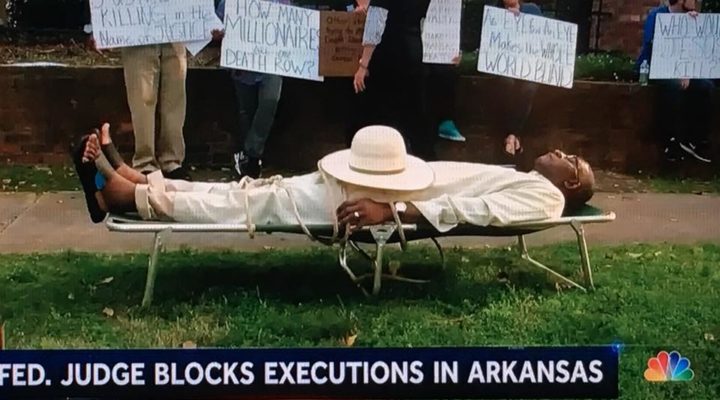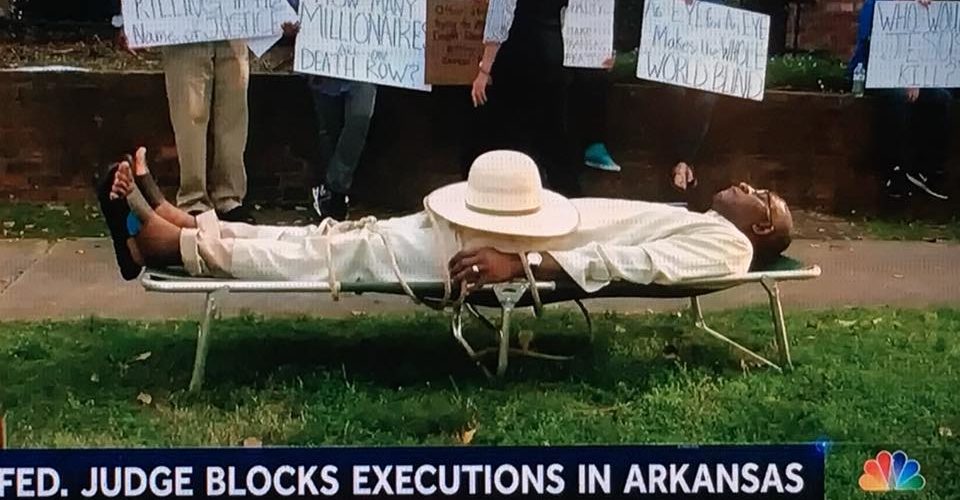An Arkansas judge who also serves as a Baptist pastor defended his participation in a death penalty protest after issuing a court order barring the state from using an execution drug, saying his ruling on facts in a property dispute had nothing to do with his personal views on capital punishment.
Pulaski County Circuit Judge Wendell Griffen said in a blog April 19 he was preparing to join other members of New Millennium Church in Little Rock for a Good Friday prayer vigil outside the Arkansas Governor’s Mansion when he received a motion seeking a temporary restraining order to block the first of a series of executions scheduled to begin the day after Easter.
The party bringing the complaint claimed the Arkansas Department of Corrections had purchased vercuronium bromide — one of three drugs used in the state’s secretive execution protocol — illegally under false pretenses and wanted the product returned.
Griffen determined the presented facts showed the drug’s distributor risked imminent and irreparable harm and had a legal claim likely enough to succeed to order the state not to use or dispose of the drug until a hearing. He then went to the protest, where for an hour-and-a-half he lay on a cot posing as a dead man “in solidarity with Jesus, the leader of our religion who was put to death by crucifixion by the Roman Empire.”
Death penalty supporters responded to the judge’s reenactment by calling for his impeachment. On Monday the Arkansas Supreme Court removed Griffen from all pending death penalty and lethal injection protocol cases “to ensure that all are given a fair and impartial tribunal.”
The high court also referred Griffen to the state’s Judicial Discipline and Disability Commission to determine whether he violated the Code of Judicial Conduct requiring judges to “maintain the dignity of judicial office at all times, and avoid both impropriety and the appearance of impropriety in their professional and personal lives” and conduct themselves in ways that ensure “the greatest possible public confidence in their independence, impartiality, integrity, and confidence.”
Griffen said whether or not the drug distributor was entitled to a temporary restraining order, he is entitled to practice his religion.
“Whether I attended the Good Friday vigil or not does not change property law,” he said. “Whether anyone approves or disapproves of me attending the Good Friday vigil does not change property law. Whether I support or am opposed to capital punishment does not change property law. I am entitled to practice my religion — whether I am a judge or not — even if others disapprove of the way I practice it.”
Griffen, a member of the search committee that recommended Cooperative Baptist Fellowship Executive Coordinator Suzii Paynter and a keynote speaker at the CBF General Assembly in 2013, denounced secrecy in the execution process at a breakout session on the death penalty at last year’s General Assembly in Greensboro, N.C.
“If you want to euthanize your dog, you know that under your state only the people who have certain credentials can put your dog down,” Griffen said at the CBF workshop. “If you want to euthanize your neighbor — if you want to kill your neighbor in the name of the state — I ten-time double-dog dare you to find out the qualifications of the person who is doing it.”
“As a matter of fact, there is no requirement that the state tell you, and they have an affirmative obligation to not disclose that,” the judge continued. “It is amazing. One would call it irony, but it’s too nice a word.”
Griffen said in Wednesday’s blog he recognizes that people have strong views on capital punishment.
“I have strong views about capital punishment also,” he acknowledged. “But none of our views about capital punishment, whatever they may be and however strongly we may hold them, affect the facts in the TRO motion I reviewed and decided on Good Friday. None of our views about capital punishment, whatever they may be and however strongly we may hold them, are relevant on whether anyone has a legal claim to recover property that has been wrongfully obtained and is threatened to be imminently and irreparably used despite the demand of its rightful owner.”
Griffen has long argued that his judicial role does not negate his responsibility to speak prophetically as a pastor, often leading to clashes with political opponents.
As a member of the Arkansas Court of Appeals appointed by Gov. Jim Guy Tucker in 1996, Griffen clashed with the Arkansas Judicial Discipline and Disability Commission over comments in 2002 criticizing the University of Arkansas’ racial diversity in the wake of the firing of popular basketball coach Nolan Richardson. He later criticized President Bush, the war in Iraq and the U.S. response to Hurricane Katrina.
The ethics panel eventually dropped its case against Griffen, but he was voted out of office when he sought re-election in 2008. In 2010, he was elected to Circuit Judge for the 5th Division in Arkansas and re-elected in 2016.
Last November Griffen blogged about male white supremacy and President Donald Trump. Recently he opposed a proposal to increase public funding of Little Rock School District, protesting the district’s January 2015 takeover by the Arkansas Board of Education and dissolution of a majority-black school board elected by voters in 2014.
“I was not supposed to think about whether making the correct legal decision would be popular to anyone, including myself, the moving party, the Department of Correction, or anyone else,” Griffen said of last Friday’s ruling. “I was supposed to focus on the facts and the law.”
“That is what judges do, whether we are religious or not,” he said. “That is what judges do, whether we support or oppose capital punishment. This is what judges do, whether other people like it or not.”
Previous stories:
Arkansas plan to execute 7 men in 11 days strengthens faith, death penalty opposition
Judge criticizes secrecy in U.S. executions
Son of executed woman says no one has the right to say someone cannot change


